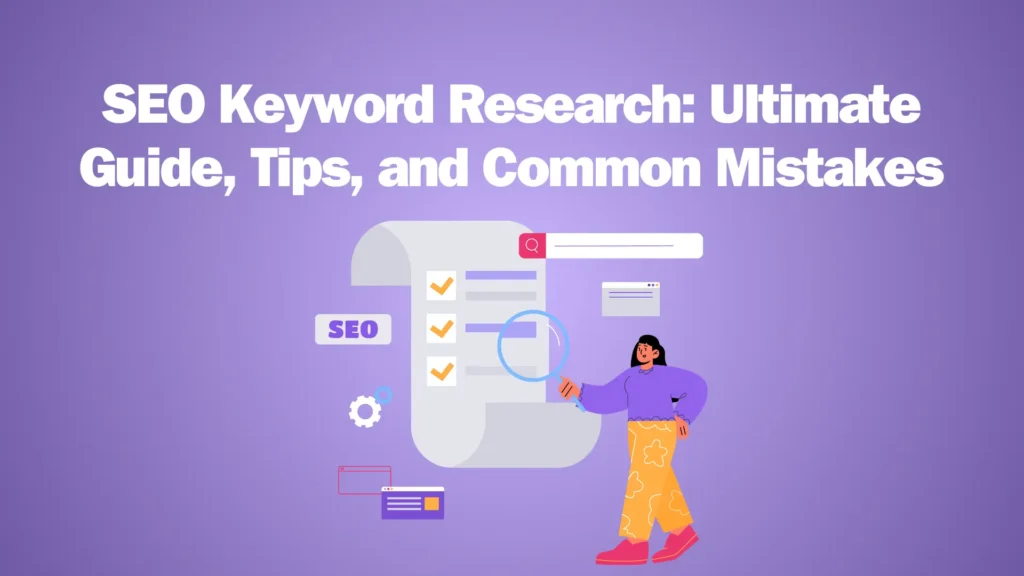
SEO Keyword Research: Ultimate Guide, Tips, and Common Mistakes
SEO keyword research forms the bedrock of any successful digital marketing campaign. It’s the critical process of understanding the words and phrases your target audience uses when searching online. Without it, creating content that ranks well and resonates with your audience becomes a guessing game.
In this guide, we’ll explore how mastering SEO keyword research not only improves search rankings but also ensures your content connects with users’ intent. Whether you’re an experienced marketer or just getting started, the strategies outlined here will provide actionable insights to optimize your approach.
What is SEO Keyword Research?
At its core, SEO keyword research is about uncovering the specific words and phrases that people type into search engines. It involves identifying:
- High-Volume Keywords: Terms frequently searched by your audience.
- Long-Tail Keywords: Highly specific, niche phrases with lower competition.
- User Intent: The purpose behind a search query—whether it’s informational, navigational, or transactional.
Think of SEO keyword research as the compass that aligns your website’s content with the right audience, helping you capture search demand and improve visibility.
Why is SEO Keyword Research Crucial for Your Business?
- Drives Organic Traffic: By targeting the right search terms, you position your site to attract high-quality, organic visitors.
- Improves User Experience: Understanding user intent helps you craft content that answers specific questions or solves problems.
- Boosts Conversion Rates: Keywords that align with purchase intent or decision-making stages lead to more effective conversions.
- Enhances Competitive Edge: Comprehensive keyword research reveals opportunities that your competitors might overlook.
Without proper research, your efforts risk being wasted on content that fails to engage or convert your audience.
Step-by-Step Approach to Effective SEO Keyword Research
1. Define Your Target Audience
Understanding who your audience is and what they need is the first step. Consider their demographics, preferences, and pain points. For example, if you’re targeting small business owners, focus on their search behavior related to tools, strategies, or solutions.
2. Brainstorm Seed Keywords
Seed keywords are foundational terms directly tied to your business. For instance, if you’re in digital marketing, your seed keywords might include “SEO services,” “content marketing,” or “social media strategies.” Use these as starting points for broader research.
3. Expand Using Research Tools
Leverage tools to generate keyword ideas and analyze their potential. Popular options include:
- Ahrefs: Offers in-depth keyword analysis and competitor insights.
- Google Keyword Planner: Provides search volume, competition, and related terms.
- Ubersuggest: Great for identifying content gaps and long-tail keywords.
4. Evaluate Metrics
Key metrics include:
- Search Volume: How often a keyword is searched.
- Keyword Difficulty (KD): Competition level for ranking.
- Click-Through Rate (CTR): Likelihood of users clicking on results.
Focus on keywords with moderate difficulty and strong alignment with your audience’s needs.
5. Segment by Search Intent
Classify keywords into three types:
- Informational: Queries like “What is SEO keyword research?”
- Navigational: Searches like “Ahrefs login” or “Vicranci SEO services.”
- Transactional: Terms such as “buy SEO tools” or “hire an SEO consultant.”
This segmentation ensures your content addresses users at different stages of their journey.
6. Prioritize Long-Tail Keywords
While short-tail keywords like “SEO” may have high search volume, they’re often extremely competitive. Long-tail keywords (e.g., “best SEO keyword research tools for beginners”) are more specific and likely to convert.
7. Refine and Monitor
SEO is a dynamic field. Regularly update your keyword strategy using tools like Google Trends to track shifts in search behavior and seasonal trends.
Common Mistakes in SEO Keyword Research (And How to Avoid Them)
Even seasoned marketers can misstep. Avoid these pitfalls to maximize your results:
1. Ignoring User Intent
Targeting keywords without understanding the “why” behind them results in irrelevant traffic. Instead, always align your keywords with user intent.
2. Overemphasizing Search Volume
High search volume doesn’t guarantee relevance. Balance volume with specificity and competition metrics.
3. Overlooking Long-Tail Opportunities
Focusing solely on broad keywords limits your reach. Long-tail terms often yield better ROI and connect with niche audiences.
4. Keyword Stuffing
While including your focus keyword is important, overusing it can harm readability and SEO. Opt for natural, contextual placement.
5. Neglecting Regular Updates
Search behavior evolves. Failing to revisit your keyword strategy leads to missed opportunities. Schedule periodic reviews to stay competitive.
Advanced Strategies for SEO Keyword Research
Optimize for Featured Snippets
Google’s featured snippets capture prime real estate in search results. To rank for snippets:
- Target question-based keywords (e.g., “How to do SEO keyword research?”).
- Provide concise, well-structured answers.
Leverage Latent Semantic Indexing (LSI) Keywords
LSI keywords are contextually related terms that enrich your content. For example, alongside “SEO keyword research,” include phrases like “keyword analysis tools” or “search term optimization.”
Spy on Competitors
Tools like SEMrush let you analyze competitors’ keyword strategies. Identify gaps or untapped opportunities to differentiate your content.
Take Control of Your SEO Success
Effective SEO keyword research transforms your website from a static presence to a dynamic traffic generator. By identifying the right keywords, aligning them with user intent, and continuously refining your strategy, you pave the way for sustainable growth.
Need expert assistance? Start optimizing your SEO today with a free consultation from Vicranci, your trusted partner in digital success.
Stay Up To Date Subscribe To Our Latest SEO Guide
This website is created by Vic Ranci Digital Marketing
Copyright © Vic Ranci 2024. All Rights Reserved.

